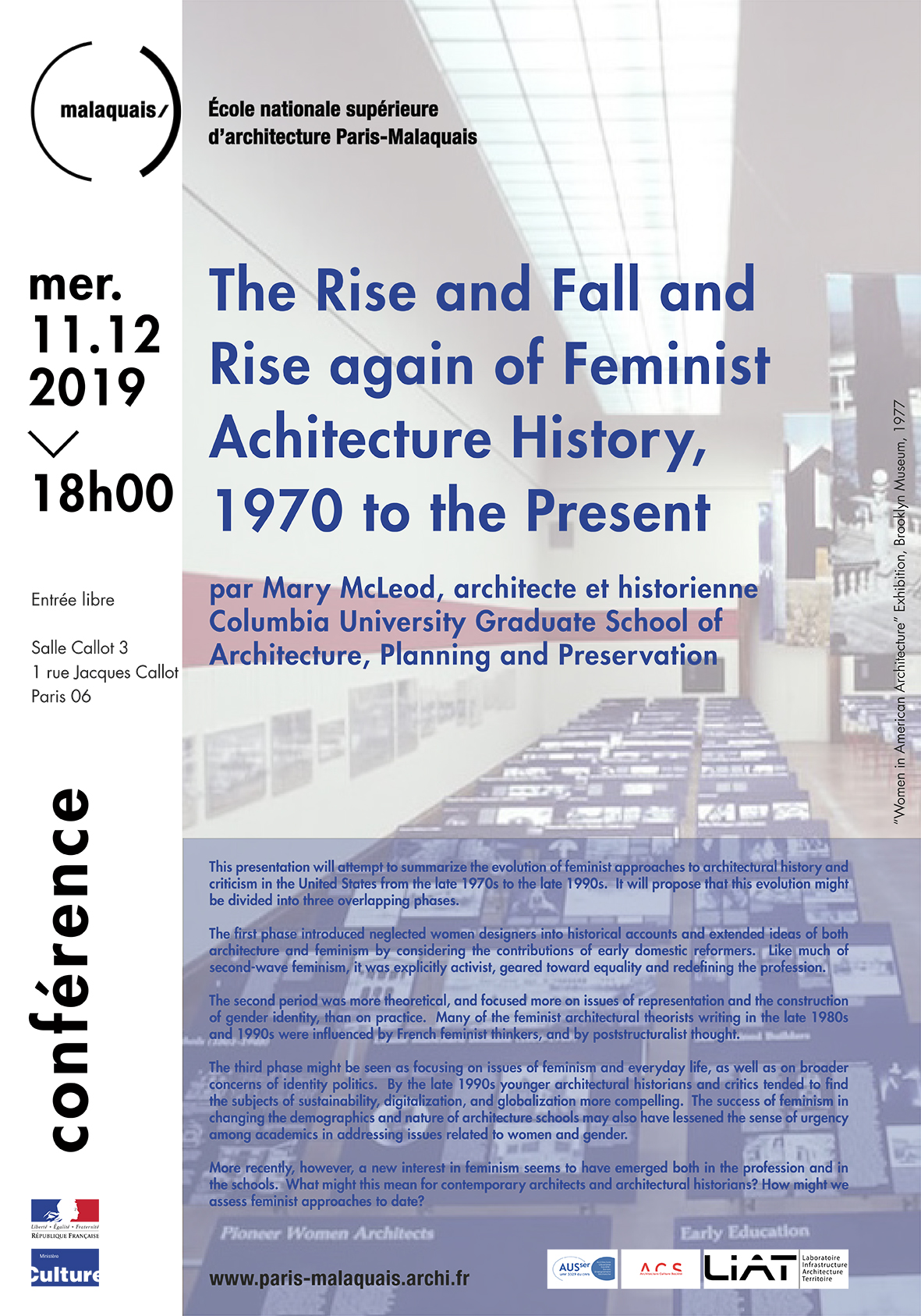"The Rise and Fall and Rise Again of Feminist Architectural History, 1970-Present" – Conférence de Mary McLeod
11 Dec 2019
Dans le cadre du programme 1989, hors champ de l’architecture officielle (laboratoire ACS), en partenariat avec le séminaire master/doctorat « Généalogie du projet contemporain » du département THP et le laboratoire LIAT.
Le mercredi 11 décembre
à 18h00
Conférence en anglais
Entrée libre dans la limite des places disponibles
ENSA Paris-Malaquais – Espace Jacques Callot – 3e étage
1 rue Jacques Callot, Paris 6e
This presentation will attempt to summarize the evolution of feminist approaches to architectural history and criticism in the United States from the late 1970s to the late 1990s. It will propose that this evolution might be divided into three (if overlapping) phases.
The first not only introduced neglected women designers such as Julia Morgan, Eleanor Raymond, Marion Mahony Griffin, and Natalie de Blois into historical accounts, it also extended ideas of both architecture and feminism by considering early domestic reformers such as Catherine Beecher, Charlotte Perkins Gilman, and Christine Frederick. Like much of second-wave feminism, it was explicitly activist, and geared toward not only equality but also redefining the profession. The second period, which began to emerge in the late 1980s and was dominant—at least, on the east coast— in the early 1990s, was more theoretical, and focused more on issues of representation and the construction of gender identity, than on practice. Many of the feminist architectural theorists writing in the late 1980s and 1990s were influenced by French feminist thinkers, most notably Hélène Cixous and Luce Irigary, as well as poststructuralist thought. The third phase, emerging in the mid 1990s, might be seen as focusing on issues of feminism and everyday life, as well as on broader concerns of identity politics. While many feminist architectural historians and critics continued to write and produce interesting new scholarship and theoretical work, by the late 1990s younger architectural historians and critics tended to find other subjects—for example, sustainability, digitalization, and globalization—more compelling. The success of feminism in changing the nature of architecture schools may also have lessened the urgency among academics in addressing issues related to women and gender.
More recently, however, a new interest in feminism seems to have emerged both in the profession and in the schools. In the discussion, I would like to consider what that might mean for contemporary architects and architectural historians, as well as to assess feminist approaches to date.
Architecte et historienne de l’architecture, Mary McLeod est professeure d’architecture à la Columbia University Graduate School of Architecture, Planning and Preservation (GSAPP), où elle enseigne l’histoire et la théorie de l’architecture et, à l’occasion, le projet. Elle a également enseigné à Harvard University, à l’University of Kentucky, à l’University of Miami et à l’Institute for Architecture and Urban Studies. Ses recherches et publications portent sur l’histoire du mouvement moderne et sur la théorie de l’architecture contemporaine, ainsi que sur le féminisme et l’architecture, en examinant des questions relatives aux liens entre l’architecture et l’idéologie.
Mme McLeod a co-dirigé les ouvrages « Architecture, Criticism, Ideology » et « Architecture Reproduction ». Elle a dirigé et contribué à la monographie « Charlotte Perriand: An Art of Living », et a initié et contribué au commissariat de l’exposition « Charlotte Perriand: Interior Equipment » à l’Urban Center de New York. Ses articles ont paru dans « Assemblage », « Oppositions », « Art Journal », « AA Files », « JSAH », « Casabella », « Harvard Design Magazine » et « Lotus », ainsi que dans d’autres revues et anthologies, telles que « The Sex of Architecture », « Architecture in Fashion », « Architecture of the Everyday », « Architecture and Feminism », « The Pragmatist Imagination », « The State of Architecture », « Fragments: Architecture and the Unfinished », « Architecture Theory since 1968 », « Oppositions Reader », « Le Parole dell’Architettura », et « Modern Women: Women Artists at The Museum of Modern Art ». Elle est la co-rédactrice, avec Victoria Rosner, du site « Pioneering Women of American Architecture ». Mary McLeod a reçu de nombreuses bourses et récompenses, dont une bourse Fulbright, un prix du National Endowment for the Humanities, ainsi que des subventions du New York Council of the Arts et de la Graham Foundation.
————————
Mary McLeod is a Professor of Architecture at Columbia GSAPP, where she teaches architecture history and theory, and occasionally studio. She has also taught at Harvard University, University of Kentucky, University of Miami and the Institute for Architecture and Urban Studies. Her research and publications have focused on the history of the modern movement and on contemporary architecture theory, examining issues concerning the connections between architecture and ideology.
McLeod is co-editor of « Architecture, Criticism, Ideology » and « Architecture Reproduction », and is the editor of and contributor to the book « Charlotte Perriand: An Art of Living ». She also initiated and helped curate the exhibition « Charlotte Perriand: Interior Equipment », held at the Urban Center in New York. Her articles have appeared in « Assemblage », « Oppositions », « Art Journal », « AA Files », « JSAH », « Casabella », « Art Journal », « Harvard Design Magazine » and « Lotus » as well as other journals and anthologies, such as « The Sex of Architecture », « Architecture in Fashion », « Architecture of the Everyday », « Architecture and Feminism », « The Pragmatist Imagination », « The State of Architecture », « Fragments: Architecture and the Unfinished », « Architecture Theory since 1968 », « Oppositions Reader », « Le Parole dell’Architettura », and « Modern Women: Women Artists at The Museum of Modern Art ». She has received numerous fellowships and awards, including a Fulbright Fellowship, NEH award, and grants from New York Council of the Arts and the Graham Foundation.
Note post-conférence :
Pour la communauté de l’école, la captation vidéo de cette conférence est accessible sur le site intranet en cliquant ici (accès réservé aux membres de l’ENSA Paris-Malaquais).
Le mercredi 11 décembre
à 18h00
Conférence en anglais
Entrée libre dans la limite des places disponibles
ENSA Paris-Malaquais – Espace Jacques Callot – 3e étage
1 rue Jacques Callot, Paris 6e
This presentation will attempt to summarize the evolution of feminist approaches to architectural history and criticism in the United States from the late 1970s to the late 1990s. It will propose that this evolution might be divided into three (if overlapping) phases.
The first not only introduced neglected women designers such as Julia Morgan, Eleanor Raymond, Marion Mahony Griffin, and Natalie de Blois into historical accounts, it also extended ideas of both architecture and feminism by considering early domestic reformers such as Catherine Beecher, Charlotte Perkins Gilman, and Christine Frederick. Like much of second-wave feminism, it was explicitly activist, and geared toward not only equality but also redefining the profession. The second period, which began to emerge in the late 1980s and was dominant—at least, on the east coast— in the early 1990s, was more theoretical, and focused more on issues of representation and the construction of gender identity, than on practice. Many of the feminist architectural theorists writing in the late 1980s and 1990s were influenced by French feminist thinkers, most notably Hélène Cixous and Luce Irigary, as well as poststructuralist thought. The third phase, emerging in the mid 1990s, might be seen as focusing on issues of feminism and everyday life, as well as on broader concerns of identity politics. While many feminist architectural historians and critics continued to write and produce interesting new scholarship and theoretical work, by the late 1990s younger architectural historians and critics tended to find other subjects—for example, sustainability, digitalization, and globalization—more compelling. The success of feminism in changing the nature of architecture schools may also have lessened the urgency among academics in addressing issues related to women and gender.
More recently, however, a new interest in feminism seems to have emerged both in the profession and in the schools. In the discussion, I would like to consider what that might mean for contemporary architects and architectural historians, as well as to assess feminist approaches to date.
Architecte et historienne de l’architecture, Mary McLeod est professeure d’architecture à la Columbia University Graduate School of Architecture, Planning and Preservation (GSAPP), où elle enseigne l’histoire et la théorie de l’architecture et, à l’occasion, le projet. Elle a également enseigné à Harvard University, à l’University of Kentucky, à l’University of Miami et à l’Institute for Architecture and Urban Studies. Ses recherches et publications portent sur l’histoire du mouvement moderne et sur la théorie de l’architecture contemporaine, ainsi que sur le féminisme et l’architecture, en examinant des questions relatives aux liens entre l’architecture et l’idéologie.
Mme McLeod a co-dirigé les ouvrages « Architecture, Criticism, Ideology » et « Architecture Reproduction ». Elle a dirigé et contribué à la monographie « Charlotte Perriand: An Art of Living », et a initié et contribué au commissariat de l’exposition « Charlotte Perriand: Interior Equipment » à l’Urban Center de New York. Ses articles ont paru dans « Assemblage », « Oppositions », « Art Journal », « AA Files », « JSAH », « Casabella », « Harvard Design Magazine » et « Lotus », ainsi que dans d’autres revues et anthologies, telles que « The Sex of Architecture », « Architecture in Fashion », « Architecture of the Everyday », « Architecture and Feminism », « The Pragmatist Imagination », « The State of Architecture », « Fragments: Architecture and the Unfinished », « Architecture Theory since 1968 », « Oppositions Reader », « Le Parole dell’Architettura », et « Modern Women: Women Artists at The Museum of Modern Art ». Elle est la co-rédactrice, avec Victoria Rosner, du site « Pioneering Women of American Architecture ». Mary McLeod a reçu de nombreuses bourses et récompenses, dont une bourse Fulbright, un prix du National Endowment for the Humanities, ainsi que des subventions du New York Council of the Arts et de la Graham Foundation.
————————
Mary McLeod is a Professor of Architecture at Columbia GSAPP, where she teaches architecture history and theory, and occasionally studio. She has also taught at Harvard University, University of Kentucky, University of Miami and the Institute for Architecture and Urban Studies. Her research and publications have focused on the history of the modern movement and on contemporary architecture theory, examining issues concerning the connections between architecture and ideology.
McLeod is co-editor of « Architecture, Criticism, Ideology » and « Architecture Reproduction », and is the editor of and contributor to the book « Charlotte Perriand: An Art of Living ». She also initiated and helped curate the exhibition « Charlotte Perriand: Interior Equipment », held at the Urban Center in New York. Her articles have appeared in « Assemblage », « Oppositions », « Art Journal », « AA Files », « JSAH », « Casabella », « Art Journal », « Harvard Design Magazine » and « Lotus » as well as other journals and anthologies, such as « The Sex of Architecture », « Architecture in Fashion », « Architecture of the Everyday », « Architecture and Feminism », « The Pragmatist Imagination », « The State of Architecture », « Fragments: Architecture and the Unfinished », « Architecture Theory since 1968 », « Oppositions Reader », « Le Parole dell’Architettura », and « Modern Women: Women Artists at The Museum of Modern Art ». She has received numerous fellowships and awards, including a Fulbright Fellowship, NEH award, and grants from New York Council of the Arts and the Graham Foundation.
Note post-conférence :
Pour la communauté de l’école, la captation vidéo de cette conférence est accessible sur le site intranet en cliquant ici (accès réservé aux membres de l’ENSA Paris-Malaquais).



